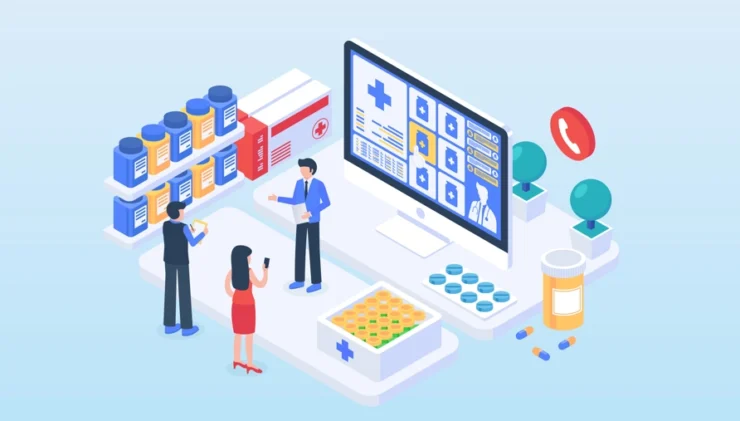The digital age is a major thing today. We can see some experts talking about it being something for the future. However, when you take a look about the situation we have today, modern technology has already reached a significant level. At the same time, we would like to say that there’s so coming back. It has already become a major part of all the industries. Probably the biggest impact of digitalization is currently in the medical industry. There’s almost no company that hasn’t implemented it.
The higher accessibility is especially beneficial for those with limited mobility and people living in remote areas where access to traditional pharmacies can be more challenging. Using online stores represents a much easier way to get what you need, and one example is https://richter.am/
This article will provide more details about the impact of the IT industry on healthcare.
Benefits For The Healthcare System

One of the main benefits is increased efficiency, which is provided by a wide range of online platforms. Therefore, you can skip the public institution and waiting in lines. Instead of that, you can use a platform where you can register and communicate with your doctor, and all prescriptions and other services can be done online.
Moreover, you can consult with your doctor or even have a simple check-up without the need to visit a hospital. That makes the medical institutions more efficient since they can focus more on patients with more challenging conditions.
There is also a potential to regulate the price of medical services and make them more affordable. That will lead to availability to more people, especially those groups with lower salaries and without proper healthcare insurance.
Another important advantage is related to improved coordination and care for patients, such as secure sharing of patient information, less paperwork, and lower risk of errors. Also, proper care and prevention can be improved with AI technology, where experts can analyze big data to identify conditions, determine health risks, and provide the right treatment.
Besides that, we have to mention the possibility of consulting with doctors from different areas. That is reducing the need for traveling. For example, if you know about an expert in another country or state, remote consultations are a perfect solution.
Rise of Online Pharmacies

It is not common for pharmaceutical companies to have their online stores. The main advantage of that is convenience. There is no more need to wait in line when you can order the products you need online. Also, the process of getting the required medication is much easier.
For example, if there is one type of medicine that you can find in a certain store, and then you have to visit another one for something else, using online platforms instead will save you a lot of time and effort. Besides that, you don’t need to check out working hours or worry about some stores being closed.
However, you should keep in mind that there is a wide range of online platforms that you can find today, but not all of them are safe and reliable. Before you order any medicine, be sure that the website you are using is well-known, safe, and reliable. You should check for their license as well.
We also have to mention the advantage of creating a personal profile on some websites. You can provide more details about your conditions, along with the electronic medical record. The best part is that you can use this feature to get the medicine that require prescriptions, and you can still get them without visiting a public pharmacy.
On the other hand, we also have to mention potential downsides of using online pharmacies all the time. As we already mentioned, there is a risk of using the unknown online service, and that can lead to risk of getting fake drugs. The result of that can be even more serious health conditions.
Also, relying only on these stores all the time is not the best solution. It is common for people these days to research the internet when they are ill. Keep in mind that only an expert can lead to the right conclusion and determine the right treatment. Therefore, be sure to always consult with your doctor before using this option.
What To Expect In The Future?

We think that even more institutions will integrate new models and technologies. That will lead to many benefits like improved personalized medicine, better communication, and higher success in treatments.
We expect that doctors will rely more on AI when it comes to diagnostics since that will make it more accurate and faster. There are already advanced tools that can recognize certain patterns and other details, leading to a faster and more accurate determination of some conditions.
Furthermore, we expect that the telemedicine will become standard since it offers a more convenient model of consultations, but also some even more advanced features like remote monitoring of patients, and remote surgeries.
With the development of nanotechnology and biotechnology, experts will get the ability to create personalized treatment models that will lead to a much higher accuracy, and increased level of cured patients.
Final Thoughts

As you can see, there is a huge impact of the IT technology on the whole healthcare industry. Online platforms are especially important as a model of communication between doctors and patients. That is allowing people with certain conditions to stay at home while receiving the right treatment through delivery services.
When it comes to online pharmacies, most people prefer them since it is easier to buy medicine that way. However, it is important to pay attention that the website you are using has a proper license. Also, be sure to consult with an expert before choosing any sort of medication.
In the end, new technologies are revolutionizing the medicine in many ways, and the results of that are higher efficiency in treatments, prevention of serious diseases, and higher availability to a larger group of people, especially endangered groups who cannot afford healthcare as it is today.

